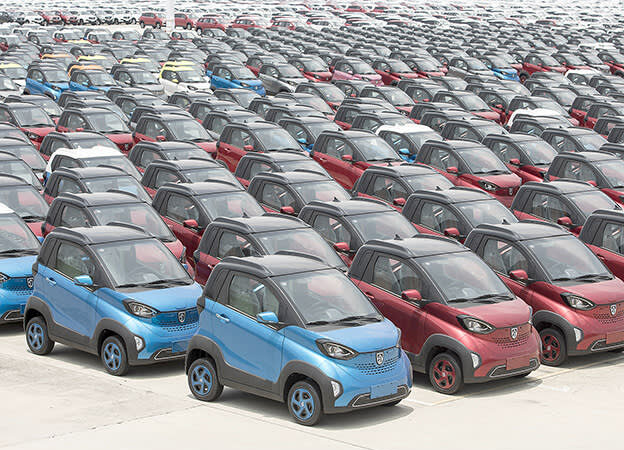
- Europe won’t match US 100 per cent EV tariff on China
- German carmakers fear trade retaliation
Election season is hotting up in the US and this isn’t just down to the salacious testimonies in Donald Trump’s court cases. Both political parties are vying to be toughest on China, as the Biden administration announced 100 per cent tariffs on Chinese electric vehicles (EVs) while Trump has pledged to go even further.
This new green protectionism has worldwide ramifications: China’s whole economic model is predicated on being able to dump cheap goods and, when it comes to high-spec technologies that require developed infrastructure, there are only a few markets for them. Essentially that boils down to the US, Japan, parts of Southeast Asia, Australasia and Europe.
America’s firm stance creates a headache for the European Union in particular, which is already by far the largest export destination for budget EV brands owned by Chinese companies such as SAIC Motor and BYD. With the US less accommodating, China will look to send more cars to Europe, threatening to overwhelm the continent’s efforts to develop its own strategic industries.
Unlike the West, where output is mostly decided by market forces, the Chinese Communist party (CCP) often dictates what is made. If the CCP says it wants to become a world leader it will print money and lend to the factories to make it happen. Markets for these goods can be found later.
China could dominate the EV market this year
Even with its 1.4bn people, China can’t rely on its domestic market for demand to match the proscribed output and make it sustainable. That’s despite today’s impressive numbers: Rystad Energy forecasts that in 2024 China will account for 11.5mn of 17.5mn worldwide EV sales.
China is grappling with the issue of an impending demographic decline – the legacy of the one-child policy means there soon won’t be a high enough proportion of people under 40 – so consumer-led booms will become harder to stimulate.
Therefore, if unchecked, the modus operandi will continue to be selling abroad at prices local manufacturers can’t compete with. European policymakers face a difficult balancing act, especially as the industry they are trying to protect has deep relationships in China. The European Commission has given itself until 4 July to formulate provisional tariffs and quotas on Chinese EVs.
Speaking with CNN Business, Agatha Kratz of research provider Rhodium Group said duties of 40 to 50 per cent would be necessary to “make the EU market unattractive for Chinese EV exporters” but added that they would struggle to go above 30 per cent. Instead, Katz suggested, Europe would have to push non-tariff measures such as stricter enforcement of environmental and labour standards.
Europe’s auto industry is stuck between the devil and the deep blue sea. Cars were still Germany’s number one export in 2022, with China the biggest destination, accounting for $20.5bn (£16bn) out of $149bn total German auto exports in 2022, according to the Observatory of Economic Complexity (OEC).
With Germany accounting for over a third of eurozone manufacturing this will weigh heavily on the EU’s decision making. Economists at investment bank Berenberg note that Germany’s high dependence on cyclical export industries have delayed inventories drawing down enough for activity to ramp up again.
The need to avoid a tit for tat with China
Getting its industrial powerhouse firing is essential to ending Eurozone stagnation, which is all the more reason to tread carefully. Bringing on a tit-for-tat with Beijing could see any recovery potentially being stifled because of the size of Chinese consumer demand for European goods.
In a sense, Europe has been here before. Becoming overly reliant on Russian energy was a monumental strategic blunder, but the EU reduced imports of fossil fuels from the pariah to its east from $16bn per month at the time of the Ukraine invasion to $1bn per month by the end of 2023, according to thinktank Bruegel. Re-jigging of oil & gas supply lines shows what is possible and Berenberg points to falling energy prices helping consumers and the eurozone recovery.
China, with its place at the heart of global manufacturing, is a different beast to Russia, but it doesn’t necessarily have the whip-hand over Europe. The EU market is going to be more important if China isn’t to drown in its own surpluses – being isolated risks making other subsidised industries as vulnerable as its real estate sector (which has no export release valve).
Immediate interests of the big German auto exporters will probably water down the commission’s response – after all, Chinese EVs are really more a threat at the lower, affordable end of the market, which the likes of BMW don’t target – but that doesn’t mean the CCP shouldn’t be a little uneasy.






